#adhd inertia
Explore tagged Tumblr posts
Text
I need to do something I need to do something I need to do something I need to do something-
Scrolls Tumblr frantically with mounting anxiety
#audhd problems#audhd system#pluralpunk#pluralgang#endo safe#endo friendly#tulpa safe#tulpa friendly#willogenic safe#willogenic friendly#multiplicity#plural#system#did osdd#plural community#actually mentally ill#actually disabled#actually autistic#actually adhd#actually audhd#task paralysis#adhd inertia#someone switch in pls#aaaaaaaaaaa#yami posting
40 notes
·
View notes
Text
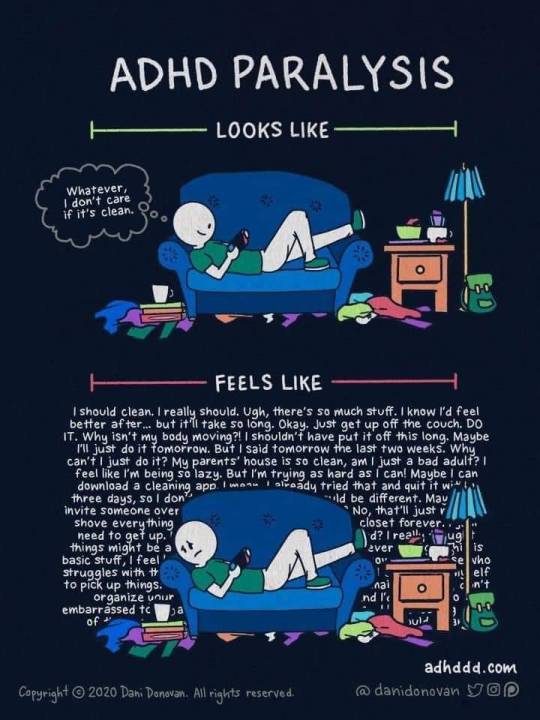
133 notes
·
View notes
Text
I'm writing so much fic these days that i can't find the time to read any. when i'm done writing my brain doesn't want to read any more words. but if i stop writing I will lose!!!!
7 notes
·
View notes
Note
what do you mean by “adhd paralysis isn’t real?” like in what way? this is a genuine question and i’m trying not to let my hurt feelings affect this bc i’m trying to learn and i don’t know everything.
if you don’t feel like answering that’s cool too, but can you direct me to who was talking about this?
Hi! Paralysis is a permanent state. When used in terms of bodily functions, it means "loss of [muscle] contraction due to interruption of one or more motor pathways from the brain to the muscle fibers." Paralysis/plegia (e.g., hemiplegia) is used to refer to complete or severe loss of muscle strength, while paresis is used to refer to partial or slight loss of muscle strength. (source)
ADHD does not include loss of muscle strength (paralysis), and if you're attributing paralysis to ADHD it means you really need to see a doctor. What ADHD does include (that many people seem to confuse for paralysis) is executive dysfunction, which can make it difficult to move at times but never causes permanent loss of muscle strength. Another thing that people are confusing for paralysis (which very much isn't) is catatonia, and I've seen people describe catatonic episodes as paralysis. Catatonia is a feature of schizophrenia spectrum disorders (most often schizoaffective, schizophreniform, and schizophrenia) and can occur alongside autism spectrum disorder, but does not occur as part of ADHD.
Claiming that you are experiencing "ADHD paralysis" is offensive to those who actually are paralyzed, especially with what I've been seeing on actual paralyzed people's blogs from people with "ADHD paralysis."
Additionally, if you search "ADHD paralysis" here on Tumblr you'll get a whole bunch of posts about people talking about their executive dysfunction. This is fine, in general, but they're misusing medical terminology and it is harmful.
#disclaimer that I am not paralyzed#however I follow blogs run by paralyzed people#and I have heard their grievances voiced and would like to amplify their voices#also I think it's stupid to have a thousand terms for the same experience#“autistic inertia” “adhd paralysis” it's executive dysfunction jesus fucking christ#using 800 different names for the same phenomenon only serves to confuse people#asks answered#adhd#adhd paralysis#executive dysfunction
32 notes
·
View notes
Text
As a neurodivergent scientist, I think it is funny that I have executive dysfunction on an atomic level as well.
14 notes
·
View notes
Text
my therapist spent today's session making Faces at me about getting an ADHD diagnosis
which
I can honestly say I have never seriously considered the possibility of seeking an ADHD diagnosis but she might not be a billion miles off
I was describing how I get "fizzy bored" where I have no energy or ability to move and nothing holds my attention but I feel like my bones are trying to vibrate out of me with the desire to be Doing Things and she was like 🤔 and I got onto the fact that I often need to be doing 3-4 things at once to ease into focusing on one and she was like 🤨 and then I mentioned how I find it really difficult to start doing things but once I'm in it I'm super focused and she was like 😌 have you considered the possibility of an ADHD diagnosis?
and so I explained that I don't really see the point because even though, unlike EDS and autism, a diagnosis could suggest an actual treatment, I don't really feel like anything I've described is disabling me cause I have the tools to manage it now most of the time and I feel Fizzy Bored WAY less often these days. and she was like 🤨
and I was like yeah to be fair actually I did use to think that about chronic pain, trauma and having shit eyesight and doing something about them did really change my experience. and she was like 😌 and I was like and actually now we mention it the fact that I sometimes for NO REASON AT ALL simply put off doing things even though they would be really easy to do and I want to do them for LITERAL YEARS is maybe. A thing that it might be nice to change if I could. And she was like 🤔 and I was like OH FUCK I'M GOING TO HAVE TO GENUINELY CONSIDER THIS POSSIBILITY AREN'T I?
anyway after talking a mile a minute and overrunning by 15 minutes I then got a quarter of a mile away on foot and realised I'd left my glasses on her table. she opened the door I went HEY SPEAKING OF ADHD
#red said#tbf that last bit is only funny jokes. i mean i did do that but that is not one of the marks in the ADHD??? column#i am not a habitual leaver behind of things i generally do a full check#but also here's the issue I'm having#(apart from the fact that the tiktokification of ADHD has really muddied the waters on what is or isn't a likely indicator)#the issue is i am REALLY GOOD at coping mechanisms and workarounds. like SO GOOD. so i am goofy but I'm legit not scatterbrained#and i am. to quote a past manager. 'frighteningly efficient'.#but there is no doubt that i have legit issues with time blindness#thought permanence. like if i do not write something down in a place where i can see it regularly i will forget it.#and i WILL stop seeing it if it doesn't change enough or if i have to go out of my way to look at it#and yeah like the whole inertia and energy disregulation stuff is. it's not nothing.#and i am SO MAD that she might have a point and tbh i don't even know why I'm that mad about it#other than that having diagnoses of CPTSD autism and adhd would feel like the Internet Diagnostics Starterpack i guess. feels basic.#i dunno man it's dumb brain stuff it's not rational! that's a dumb reason to reject an idea even if it was a legit complaint which it is no#also i have been really giddy and hyper this evening and idk if that's bc I've had some manner of breakthrough thing or I'm just suggestible
17 notes
·
View notes
Text
"Enjoy lyrics on Spotify Premium" congratulations, I'm finally migrating ten years of music off your platform come this weekend
#supplemental log#when the egregiousness of enshittification finally overcomes the adhd inertia#anyway if anyone has non-spotify (and non-apple) music platforms to recommend lmk#I'm eyeballing deezer for the moment
8 notes
·
View notes
Text
It is with deep sadness and a heavy heart filled with RAGE and HATRED that I must bow once more beneath the spiky egg yolk of Endless Evil Chores and Other Nasty Responsibilities. I would like to thank Mindless Scrolling for enabling me to push off this momentous occasion for as long as humanly possible. You will be missed. Until the next short break that ends up stretching on till 3 AM. A moment of silence to respect the aforementioned Mindless Scrolling. And another. And another moment of silence for steadying, mindful breaths to ground myself. Wait what do you mean I have to actually finish writing this post to get started?? Do I barge into YOUR little corner of Tumblrington Dorothy Communism to tell YOU how to be productive?? Let me cook! I have a Process!! I'm not going to keep writing this post forever but I damn well WILL contribute to the Sacred Wall Of Text until I judge it to be the correct size! And girth! And shape! And color and whatever other adjectives I deem appropriate!! You cannot stop me!! You can push and shove at the inertia but you cannot make it roll!! I defy thee! I shake my thumb in defiance!! Of thee!! Begone, Wicked Voice of Reason!! I will stay on my bed hunched over in this uncomfortable position until- oh damn my joints are stiff and painful actually imma take care of that but WE ARE NOT DONE HERE I WILL FIND YOU later
#procrastination#adhd#inertia#oh no McCoy just meowed endearingly at me :(#he's gonna be sad that I'm getting up#oh no#this is the last tag i swear
2 notes
·
View notes
Text
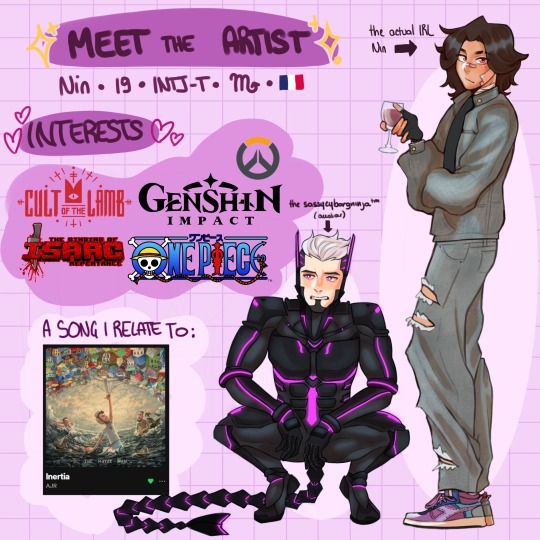
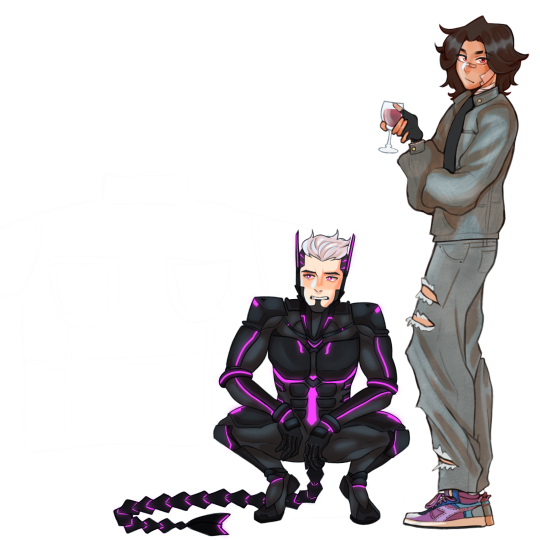

meet the artist + sketch concept art of my avatar
ive made meet the artists every year so i had to make one this year as well but i added a new thing being my avatar, the sassycyborgninja from my username (the username itself is inspired by genji hence why the antennas and lowkey resemblance)
#art#digitalart#fanart#doodle#meet the artist#concept art#conceptual#cyborg#genji shimada#genji overwatch#procreate#sketch#inertia#ajr band#interests#actually autistic#actually adhd#audhd#queer artist
10 notes
·
View notes
Text
The neurodivergent self diagnosis journey is just one day thinking 'I wonder if X health thing is connected to this' and then it certainly heckin is
Why do we get the jackpot of side effects
#guess who just discovered the name of that feeling of not waking up properly and how it relates to adhd#adhd problems#fuckin sleep inertia kicking me in thw ass every day of my life#no i cannot make your 8.30 meeting
2 notes
·
View notes
Text
Want to do art, can't do art.
Want to watch shows, can't watch shows.
Want to play games, can't play games.
Ends up on Tumblr endlessly scrolling, watching the notifications like a hawk and desperately searching for social interaction all day.
And my sysmates can't even really do anything about it because my anxious ass keeps coming back to front every five minutes 😭
#adhd issues#actually audhd#actually mentally ill#endo safe#pluralpunk#yami posting#endo friendly#pluralgang#system#multiplicity#plural#plural system#did osdd#polyfrag system#audhd#audhd problems#adhd things#task paralysis#adhd inertia
46 notes
·
View notes
Text
Eat something eat something eat something eat something eat something eat something
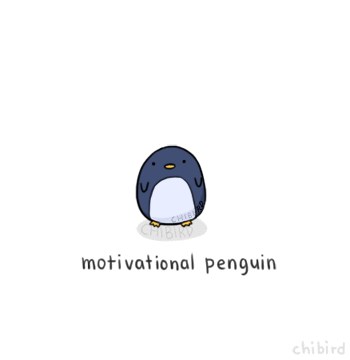
#adhd brain go brrr#autistic inertia#cerebral palsy and broken interpretation#fibromyalgia and broken homeostasis#anorexia recovery
15 notes
·
View notes
Text
I didn't realize that this kind of executive dysfunction had a specific name in autism. In the psychiatric literature I usually see it called low/poor/impaired “task-switching,” “attentional switching,” or more broadly “cognitive flexibility.” But I do like the name “inertia” because IME that is often how it feels.
Autistic inertia is probably just as common in ADHD, and probably experienced in basically the same way. “No differences in EF [executive functioning] were found between individuals diagnosed with ASD and ADHD” in a meta-analysis study trying to tease out differences between them, including on tests of cognitive flexibility.
50%–70% of autistic people have ADHD, making the conditions very frequently comorbid. Both are also highly (genetically) heritable, and both involve (itself extremely heritable) executive dysfunction.
Improving your task-switching and overcoming inertia is probably best accomplished the same way that we treat other kinds of executive dysfunction: stimulants like Adderall, caffeine (especially taken with L-theanine), and Ritalin. After all, unmedicated kids with ADHD are worse at task-switching than neurotypical kids, but ADHD medication makes their task-switching equivalent. Ritalin “selectively enhanced the children's ability to rapidly and accurately switch between tasks.”
IIRC exercise, nutrition, and (especially) getting enough/consistent sleep also help to improve task-switching.
…and yes, I did write this post while struggling to switch to a different task. Namely, my actual job. Heh. Hooray for autistic inertia…
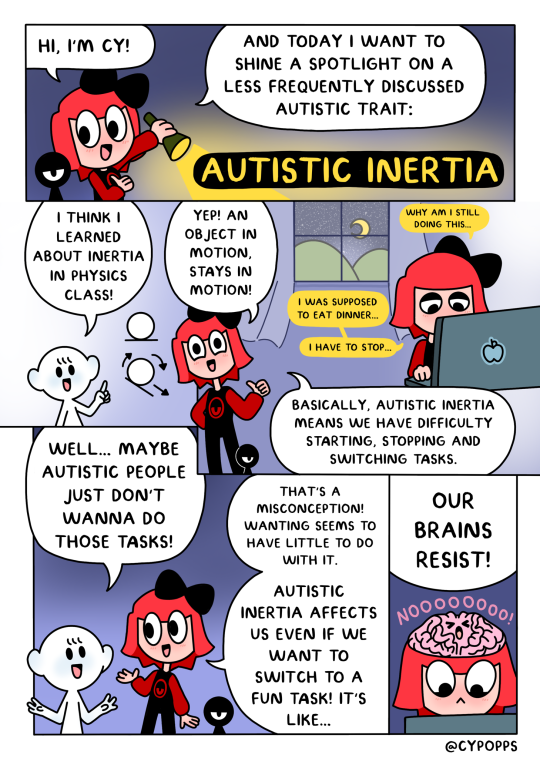
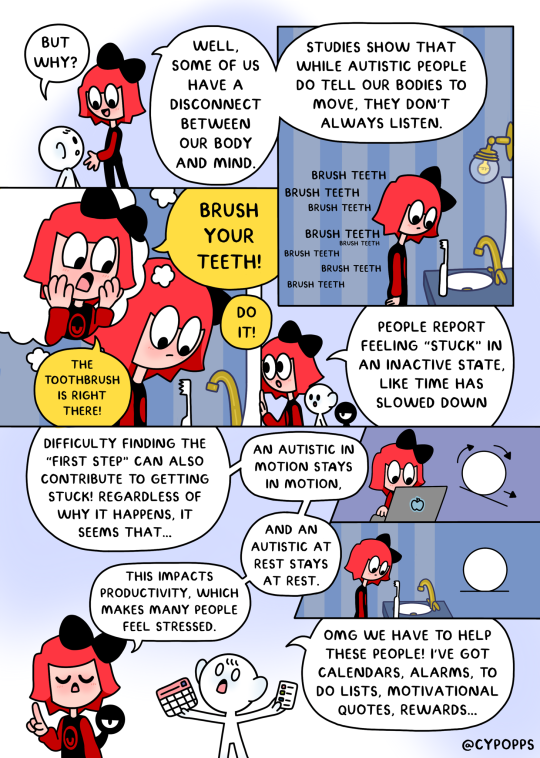
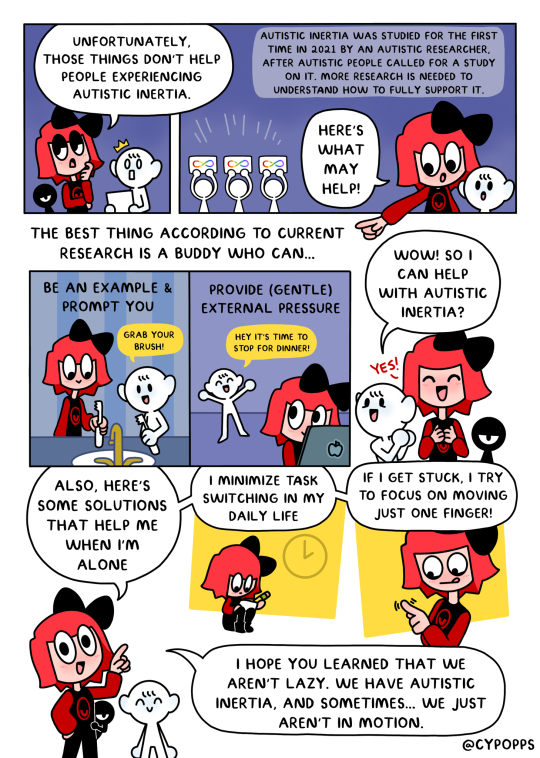
Autistic Inertia is an autism experience that makes it hard to start, stop, and switch tasks.
It somehow doesn't get talked about enough - so I made this comic!
YouTube • Instagram • Twitter
Also, if you want to read the research study I based this comic on, it’s right here!
#psychology#psychiatry#neurodivergence#autism#autistic inertia#ADHD#executive dysfunction#comic#original content#(in that I added to the post)#research#cognitive enhancement#stimulants#medication#caffeine#L-theanine#queue
59K notes
·
View notes
Text
my mom: you know, youve gotten a lot better at doing multiple things in one day without shutting down, good job!
me: thanks! im gonna go take a nap now
#i have gotten a lot better and im really proud of my progress#tho i lose all inertia the second i walk through the door and i need to cocoon for like hours sometimes#so ¯\_(ツ)_/¯#also walking for hours did not help with the pain but thats my fault for running#autism#adhd#neurodivergent#self diagnosis#also like#joint pain#bc yay bones#'lock is a little stupid sometimes
1 note
·
View note
Text
Had to stop taking my adderall because of some complications from other health issues and let me tell you.
Raw dogging the adhd for the first extended period of time since 2016 really fucking sucks.
I left my keys in my front door all night last night.
I’ve started falling asleep at work the second I get bored.
And despite being sleepy all day long I can no longer fall asleep at night.
Not to mention the persistent feeling that I’m forgetting something, with no functional way to relieve it.
0/10 would not recommend.
#adhd#this shit sucks#i also can’t get the motivation to do thing I want to do#you know it’s a problem when even your special interest can’t break the adhd inertia#did i mention that treating my adhd also helps control my depression#because it does#and now im sad#anyway that’s life and hopefully my psychaiatrist can work some magic#crow rambles
1 note
·
View note
Text
yeah no her executive is dysfunctioning pretty hard today even though she said she felt fine. so today will probably be worse for both of us than if she'd just had work like normal. yippee.
#like even once she's aware that her brain is doing dumb bullshit she still can't just circumvent it#which is why I'm forced to come to the conclusion that I genuinely do have way more capacity for self-awareness and self-control than most.#cuz shit like this happens All The Time when dealing with other people#it takes forever and external assistance for them to notice their brain shit#even if it's something they've been aware of for ages#and then even once they're aware of it they're like 'anyway back to what I was doing'#it's really frustrating.#she did apologize tho. and acknowledged when I said I'm too tired to be her executive function.#but like she knows she has adhd. she knows she has issues with executive function and inertia and prioritizing tasks.#but she can still sit there looking at camping gear for an hour after she said she'd get up and shower and tell me with no intent to deceive#that no she's doing totally fine today#like. how.#I mean I know how cuz I see people do it literally constantly but. couldn't fucking be me.
0 notes